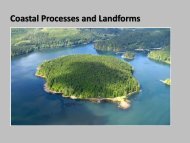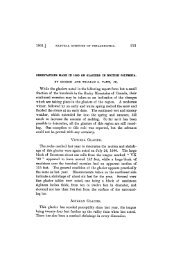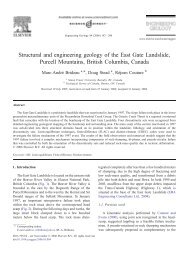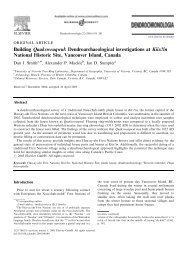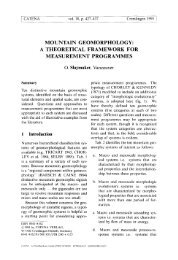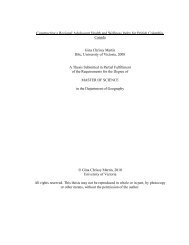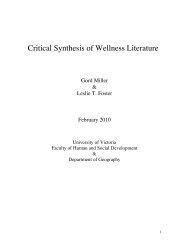Sustainable Food Production, Consumption, and the Generation of
Sustainable Food Production, Consumption, and the Generation of
Sustainable Food Production, Consumption, and the Generation of
You also want an ePaper? Increase the reach of your titles
YUMPU automatically turns print PDFs into web optimized ePapers that Google loves.
policy is in place that forces people to recycle, <strong>the</strong>re are incentives in <strong>the</strong> form <strong>of</strong> <strong>the</strong> bottle<br />
deposit-refund program enacted through <strong>the</strong> provincial government. This form <strong>of</strong> stewardship<br />
transfers responsibility for food wastes to <strong>the</strong> consumers <strong>and</strong> producers <strong>of</strong> <strong>the</strong> products <strong>and</strong> has<br />
resulted in high capture rates on applicable materials. The policy was created in response to <strong>the</strong><br />
Litter Act <strong>of</strong> 1970 to give an incentive for people to return <strong>the</strong>ir beverage containers instead <strong>of</strong><br />
throwing <strong>the</strong>m away, creating a highly successful stewardship program that evolved into <strong>the</strong><br />
Beverage Container Stewardship Program Regulation in 1997. This newest policy incorporates<br />
all ready-to-drink beverage containers aside from milk products <strong>and</strong> has culminated in an 85%<br />
return rate (MWLAP, 2004).<br />
Ano<strong>the</strong>r part <strong>of</strong> <strong>the</strong> local food waste reduction effort is <strong>the</strong> development <strong>of</strong> composting facilities<br />
<strong>and</strong> services in <strong>the</strong> CRD. At <strong>the</strong> moment <strong>the</strong> major effort in <strong>the</strong> area consists <strong>of</strong> <strong>the</strong> Greater<br />
Victoria Compost Education Center, a local not for pr<strong>of</strong>it organization, but <strong>the</strong> CRD is in <strong>the</strong><br />
process <strong>of</strong> implementing a new composting bylaw. The CRD has recognized “that over 30% <strong>of</strong><br />
<strong>the</strong> material entering <strong>the</strong> l<strong>and</strong>fill is organic material that could be composted,” <strong>and</strong> this new<br />
bylaw will be designed to divert this organic waste from <strong>the</strong> Hartl<strong>and</strong> l<strong>and</strong>fill. The bylaw will<br />
govern <strong>the</strong> licensing <strong>of</strong> composting facilities <strong>and</strong> regulate how composting is conducted. It will<br />
not implement a pickup service, but is a step in <strong>the</strong> right direction. The Bylaw will supplement<br />
provincial policy enacted in <strong>the</strong> Organic Matter Recycling Regulation <strong>and</strong> work to improve<br />
enforcement <strong>of</strong> <strong>the</strong> policy <strong>and</strong> support for local initiatives (CRD: Compost Bylaw, 2004;<br />
MWLAP: OMRR, 2002).<br />
4.5 Conclusions<br />
The preceding discussion, while in no way comprehensive, outlined parts <strong>of</strong> <strong>the</strong> present<br />
policy framework as it relates to food security, sustainable food production <strong>and</strong> waste<br />
management in Canada. The creation <strong>of</strong> food policy is rife with difficulties <strong>and</strong> intricacies that<br />
permeate all levels <strong>of</strong> government. The aim <strong>of</strong> this chapter was not to criticize government at any<br />
level, but to objectively outline present legislation <strong>and</strong> future policy that is in <strong>the</strong> works in an<br />
attempt to illustrate <strong>the</strong> role policy from all levels <strong>of</strong> government can play in local food systems.<br />
At present it seems that much <strong>of</strong> Canada’s food policy is focused on optimizing <strong>the</strong> economic<br />
value <strong>of</strong> <strong>the</strong> agriculture sector, but <strong>the</strong>re is a sense that change is in <strong>the</strong> air as more people<br />
become concerned with issues <strong>of</strong> food security <strong>and</strong> sustainable agriculture. As <strong>the</strong>y build policy<br />
frameworks for <strong>the</strong> food systems <strong>of</strong> tomorrow, policy makers must realize that legislation from<br />
all levels <strong>of</strong> government has an important role to play at <strong>the</strong> municipal scale.<br />
41



